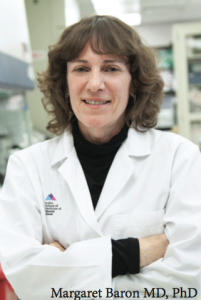By Margaret Baron, MD, PhD
 It is a real pleasure and a privilege to have been appointed Director of our Medical Scientist Training (MD-PhD) Program. I have ambitious plans for this program and will look to our exceptionally talented students to help me put these plans into action. I am grateful to Eric Nestler for his inspirational leadership as Interim Director and am delighted that he has agreed to continue his involvement in the program as Senior Advisor. I also thank the former Director, Yasmin Hurd, for her support and guidance as I take on my new responsibilities.
It is a real pleasure and a privilege to have been appointed Director of our Medical Scientist Training (MD-PhD) Program. I have ambitious plans for this program and will look to our exceptionally talented students to help me put these plans into action. I am grateful to Eric Nestler for his inspirational leadership as Interim Director and am delighted that he has agreed to continue his involvement in the program as Senior Advisor. I also thank the former Director, Yasmin Hurd, for her support and guidance as I take on my new responsibilities.
Our mission is to train the next generation of physician-scientists and leaders in the biomedical arena, whether it be academic biomedical research, government health care and science policy, biotechnology or pharmaceuticals – or exciting new career paths just over the horizon that, at present, we can only imagine. We want our students to obtain the tools they will need to succeed at the highest level in whichever career path they choose — and we want to help them begin their independent careers as soon as possible! Therefore, the challenge is to find ways to reduce the number of years needed to achieve this goal without jeopardizing the quality and rigor of their research and clinical training. I view my role, in part, as a bridge between Graduate School of Biomedical Sciences and the Department of Medical Education. My background and training have prepared me extremely well to take on the leadership of this program: I am myself a graduate of an MD-PhD Program, so I have the unique perspective and understanding of what it takes to successfully navigate the years of MD and PhD training. Following clinical training I pursued postdoctoral research before establishing my own laboratory as an assistant professor. Since moving to Mount Sinai from the Faculty of Arts and Sciences at Harvard University in 1997, I have been active in graduate education at this institution: I am a former Assistant Director of the MD-PhD program, co-founded and co-directed our Multidisciplinary Training Area (MTA) in Developmental and Stem Cell Biology (DSCB), and teach in our Biomedical Sciences courses for PhD and MD/PhD students. With sponsorship from Mount Sinai, I was a Fellow in a year- long program in Executive Leadership in Academic Medicine (ELAM), run by the Drexel University School of Medicine. This formal training helped prepared me to take on my new roles as Senior Associate Dean for Education and Director of the MD-PhD Program.
The MD-PhD Program must find innovative ways to bridge basic science and clinical medicine and expose our students to new and developing approaches to studying human disease, so that they are well positioned to become independent physician-scientists and the next generation of leaders in biomedical research and education. Our MD-PhD students must become strong critical and analytical thinkers and acquire the tools to adapt to new areas and bridge disciplines, to take advantage of new technologies as they develop. This is an exciting time that offers outstanding opportunities for new initiatives and growth. I am particularly interested in working with our faculty to restructure the MD-PhD curriculum, with a greater emphasis on experiential, team- based learning, combining case analysis with active problem solving. We are committed to integrating graduate core studies into a preclinical medical curriculum so that our students have the opportunity to engage critical thinking and experimental design concepts as they acquire basic medical knowledge. This summer, we will again offer a “Problem Solving in Biomedical Sciences” course for our incoming students. We are in the process of planning an “Advanced Biomedical Sciences for MD-PhDs” curriculum for 2015-2016. I am strongly in favor of tailoring the program to the passions and strengths of each student. To do this, flexibility in scheduling, where logistically possible, will be required. Finally, we will develop additional activities to facilitate the transition from the PhD research years back to the clinical rotation years of the program, with the possibility of earning elective credits.
Mount Sinai places a high priority on training physician-scientists; the exceptional candidates who have visited from around the country reflect the strength of our MD-PhD Program. I close by thanking our current MD-PhD students, who have been so engaged in and committed to this Program, for their enthusiastic participation. I look forward to working with each of you to ensure the success of your careers and to watching the new advances in medicine and public health that will become possible as the result of your discoveries.
